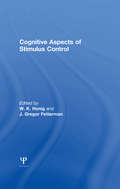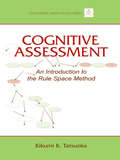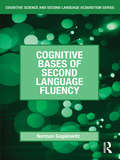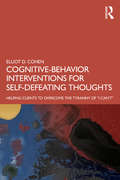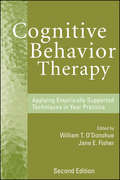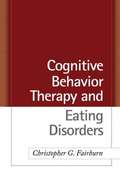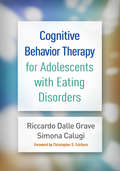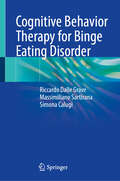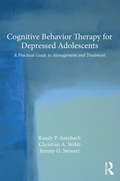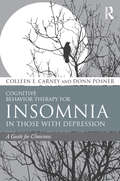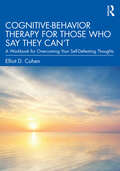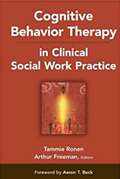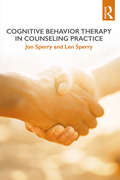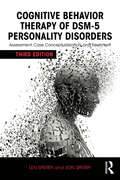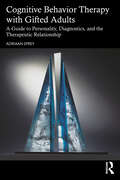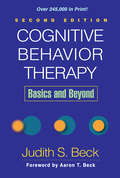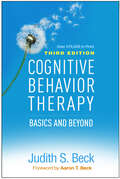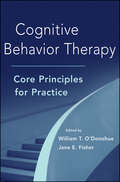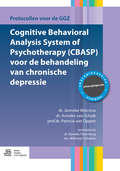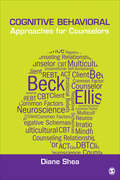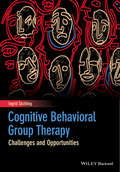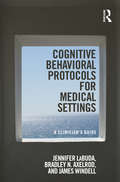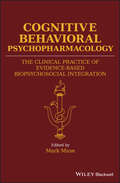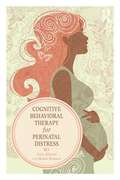- Table View
- List View
Cognitive Aspects of Stimulus Control
by W. K. Honig J. Gregor FettermanThe study of discrimination and generalization in animals traditionally involves stimuli that are simple, uniform, and restricted in time or space. In recent years, the area of stimulus control has been expanded with the use of stimuli that are complex, extended in time or space, and incorporate or represent natural objects, events, or locations. The contributors to this unique volume have emphasized controlling functions of complex stimulus events -- such as location or duration -- and their relation to cognitive processes in animals. The chapters cover a wide array of topics, including spatial cognition, categorization, pattern perception, numerosity discriminations, imagery, and spatial tracking, thereby addressing the question of how complex events are perceived, processed, and organized. This volume goes beyond other recent books on animal cognition in that it specifically places some well-known phenomena within the context of stimulus control.
Cognitive Assessment: An Introduction to the Rule Space Method (Multivariate Applications Series)
by Kikumi K. TatsuokaThis book introduces a new methodology for the analysis of test results. Free from ambiguous interpretations, the results truly demonstrate an individual’s progress. The methodology is ideal for highlighting patterns derived from test scores used in evaluating progress. Dr. Tatsuoka introduces readers to the Rule Space Method (RSM), a technique that transforms unobservable knowledge and skill variables into observable and measurable attributes. RSM converts item response patterns into attribute mastery probabilities. RSM is the only up-to-date methodology that can handle large scale assessment for tests such as the SAT and PSAT. PSAT used the results from this methodology to create cognitively diagnostic scoring reports. In this capacity, RSM helps teachers understand what scores mean by helping them ascertain an individual’s cognitive strengths and weaknesses. For example, two students may have the exact same score, but for different reasons. One student might excel at processing grammatically complex texts but miss the main idea of the prose, while another excels at understanding the global message. Such knowledge helps teachers customize a student’s education to his or her cognitive abilities. RSM is also used for medical diagnoses, genetics research, and to help classify music into various states of emotions for treating mental problems. The book opens with an overview of cognitive assessment research and nonparametric and parametric person-fit statistics. The Q-matrix theory is then introduced followed by the Rule Space method. Various properties of attribute mastery probabilities are then introduced along with the reliability theory of attributes and its connection to classical and item response theory. The book concludes with a discussion of how the construct validity of a test can be clarified with the Rule Space method. Intended for researchers and graduate students in quantitative, educational, and cognitive psychology, this book also appeals to those in computer science, neuroscience, medicine, and mathematics. The book is appropriate for advanced courses on cognometrics, latent class structures, and advanced psychometrics as well as statistical pattern recognition and classification courses taught in statistics and/or math departments.
Cognitive Bases of Second Language Fluency (Cognitive Science and Second Language Acquisition Series)
by Norman SegalowitzWinner of the 2011 Kenneth W. Mildenberger Prize Exploring fluency from multiple vantage points that together constitute a cognitive science perspective, this book examines research in second language acquisition and bilingualism that points to promising avenues for understanding and promoting second language fluency. Cognitive Bases of Second Language Fluency covers essential topics such as units of analysis for measuring fluency, the relation of second language fluency to general cognitive fluidity, social and motivational contributors to fluency, and neural correlates of fluency. The author provides clear and accessible summaries of foundational empirical work on speech production, automaticity, lexical access, and other issues of relevance to second language acquisition theory. Cognitive Bases of Second Language Fluency is a valuable reference for scholars in SLA, cognitive psychology, and language teaching, and it can also serve as an ideal textbook for advanced courses in these fields.
Cognitive Behavior Interventions for Self-Defeating Thoughts: Helping Clients to Overcome the Tyranny of “I Can’t”
by Elliot D. CohenIntegrating Cognitive Behavior Therapy (CBT) with a logic-based restructuring of Rational Emotive Behavioral Therapy (REBT), this book provides therapists with a guide for addressing self-defeating thoughts and behaviors. Cohen explores how the tyrannical use of the words "I can’t" creates and sustains many commonplace behavioral and emotional problems. It shows how cognition and affect are intimately connected, demonstrating how cognitive-behavioral interventions help clients to address both their feelings and irrational ideas. Each chapter explores a specific problem, including low frustration tolerance, obsessiveness, risk avoidance, phobias, intolerance to criticism, dependent personalities, and much more. The theories developed throughout are integrated with practice sections and session transcripts that focus on the application of these theories for the treatment of clients who have self-destructive linguistic habits. Cohen also provides resource materials including reflection activities, bibliotherapy, meditation, and step-by-step guidance. This book is essential reading for mental health professionals looking for novel techniques of using CBT, life coaches, positive psychology coaches, counsellors, and academic and clinical researchers who work with CBT.
Cognitive Behavior Therapy
by William Fisher Jane E. O'DonohueProven to be highly effective for the treatment of a wide range of problems, cognitive-behavior therapy is the most widely used psychotherapeutic technique. Building on the success of the previous edition, Cognitive Behavior Therapy, Second Edition presents specific direction for cognitive behavior therapy techniques. Fully updated and expanded, this edition contains contributions from world-renowned experts on problems including smoking cessation, stress management, and classroom management. Its step-by-step illustrations create a hands-on reference of vital cognitive-behavioral therapy skills. This reference is essential for psychologists, counselors, and social workers.
Cognitive Behavior Therapy and Eating Disorders
by Zafra Cooper Christopher FairburnThis book provides the first comprehensive guide to the practice of "enhanced" cognitive behavior therapy (CBT-E), the latest version of the leading empirically supported treatment for eating disorders. Written with the practitioner in mind, the book demonstrates how this transdiagnostic approach can be used with the full range of eating disorders seen in clinical practice. Christopher Fairburn and colleagues describe in detail how to tailor CBT-E to the needs of individual patients, and how to adapt it for adolescents and patients who require hospitalization. Also addressed are frequently encountered co-occurring disorders and how to manage them. Reproducible appendices feature the Eating Disorder Examination interview and questionnaire.
Cognitive Behavior Therapy for Adolescents with Eating Disorders
by Simona Calugi Riccardo Dalle GraveThis state-of-the-art guide provides a powerful transdiagnostic approach for treating adolescent eating disorders (anorexia nervosa, bulimia nervosa, binge-eating disorder, and others) in either outpatient or inpatient settings. It describes how enhanced cognitive behavior therapy (CBT-E)--the gold-standard treatment for adult eating disorders--has been systematically adapted and tested with younger patients. With a strong motivational focus, CBT-E gives the adolescent a key role in decision making. The book presents session-by-session guidelines for assessing patients, determining whether CBT-E is appropriate, developing case conceptualizations, conducting individualized interventions, addressing medical issues, and involving parents. User-friendly features include case vignettes and reproducible forms; purchasers get access to a Web page where they can download and print the reproducible materials in a convenient 8 1/2" x 11" size. CBT-E is recognized as a best practice for the treatment of adolescent eating disorders by the U.K. National Institute for Health and Care Excellence (NICE).
Cognitive Behavior Therapy for Binge Eating Disorder
by Massimiliano Sartirana Simona Calugi Riccardo Dalle GraveThe book is divided into three parts. Part One describes the most up-to-date scientific knowledge on the binge-eating disorder and the cognitive-behavioral theory of binge-eating disorder associated with obesity. Then it gives an overview of the treatment and how to implement it well.Part Two describes the core protocol of CBT for binge-eating disorder. To help the practitioners, the treatment is described in detail, from the first to the last treatment session. Clinical vignettes are included to illustrate the highlights, and strategies are discussed for tailoring the intervention to the individual patient's needs.Part Three illustrates the adaptation of CBT for binge-eating disorder for group settings, patients with medical and psychiatric comorbidities, and when it is delivered remotely, or it is combined with the medications for the treatment of obesity and bariatric surgery.The book is indicated for all clinicians who treat binge eating disorders and obesity (e.g. internists, endocrinologists, psychologists, psychiatrists, dieticians, nutritionists, nurses, educators, and physical therapists), but also for many clinicians (e.g., gynecologists, endocrinologists, gastroenterologists, hematologists, allergists, psychiatrists, psychotherapists, and psychologists) who, while not working in specialized clinical eating disorder and obesity centers, are involved in the management of the medical and psychiatric comorbidity of eating disorders and obesity.
Cognitive Behavior Therapy for Depressed Adolescents: A Practical Guide to Management and Treatment
by Randy P. Auerbach Christian A. Webb Jeremy G. StewartCognitive Behavior Therapy for Depressed Adolescents provides clinicians, clinical supervisors, and researchers with a comprehensive understanding of etiological pathways as well as current CBT approaches for treating affected adolescents. Chapters guide readers from preparations for the first session and clinical assessment to termination and relapse prevention, and each chapter includes session transcripts to provide a more concrete sense of what it looks like to implement particular CBT techniques with depressed teens. In-depth discussions of unique challenges posed by working with depressed teens, as well as ways to address these issues, also are provided.
Cognitive Behavior Therapy for Insomnia in Those with Depression: A Guide for Clinicians
by Colleen E. Carney Donn PosnerCognitive Behavior Therapy for Insomnia in Those with Depression is the book for clinicians who recognize that insomnia is more often a comorbid condition that merits separate treatment attention. These clinicians know that two thirds of those who present for depression treatment also complain of significant insomnia and that one third of such patients are already taking sleep medication, and they may be familiar with the research showing that treating insomnia is often important in the management of depression. But what strategies should clinicians use for treating insomnia? How can motivation be enhanced? What about medications? Students and professionals alike will find the pages of Cognitive Behavior Therapy for Insomnia in Those with Depression replete with advanced tools to address the adherence problems often encountered in this group, and they’ll come away from the book with a wealth of techniques for improving both sleep and overall symptom management as well as for treating the insomnia that occurs in comorbid disorders.
Cognitive Behavior Therapy for Those Who Say They Can’t: A Workbook for Overcoming Your Self-Defeating Thoughts
by Elliot D. CohenCognitive-Behavior Therapy for Those Who Say They Can’t is a comprehensive aid for people who stifle their personal freedom, creativity, and autonomy by telling themselves they "can’t" do things such as: take risks; make commitments; control their anger or fear; avoid intrusive thoughts; tolerate disappointment; accept challenges, make decisions, and more. This accessible workbook concisely explains how to identify, refute, and replace "I can’t" with uplifting and liberating virtues. Worksheets include systematic exercises on coping with shame, rational–emotive imagery, reframing, mindfulness, behavioral planning, and taking risks. Each chapter tackles a particular type of self-defeating "I can’t" and is complete with an assessment inventory that helps users/clients identify which chapter/s they need to work on. This workbook provides essential self-help for those struggling with disempowering thoughts and can also be used by mental health professionals in working with their clients.
Cognitive Behavior Therapy in Clinical Social Work Practice (Springer Series on Social Work)
by Arthur Freeman Tammie RonenEdited by a leading social work authority and a master CBT clinician, this first-of-its-kind handbook provides the foundations and training that social workers need to master cognitive behavior therapy. <p><p> From traditional techniques to new techniques such as mindfulness meditation and the use of DBT, the contributors ensure a thorough and up-to-date presentation of CBT. Covered are the most common disorders encountered when working with adults, children, families, and couples including: <p> Anxiety disorders <p>Depression <p>Personality disorder <p>Sexual and physical abuse <p>Substance misuse <p>Grief and bereavement <p>Eating disorders <p><p>Written by social workers for social workers, this new focus on the foundations and applications of cognitive behavior therapy will help individuals, families, and groups lead happier, fulfilled, and more productive lives.
Cognitive Behavior Therapy in Counseling Practice
by Len Sperry Jon SperryThis Cognitive Behavior Therapy text is brief, practical, comprehensive, and tailored just for counselors. Evidence-based CBT techniques are specifically adapted to counseling including core-counseling concepts such as social justice, strengths, wellness, and diversity (e.g., ethnicity, culture, sexual orientation, gender, disability) which are interwoven throughout the book’s content. Each chapter includes case vignettes that reflect the work of professional counselors in school, clinical mental health, marital and family, and rehabilitation settings.
Cognitive Behavior Therapy of DSM-5 Personality Disorders: Assessment, Case Conceptualization, and Treatment
by Len Sperry Jon SperryThe first edition of Cognitive Behavior Therapy of DSM-IV Personality Disorders broke new ground. It differed from other CBT books by offering brief but thorough user-friendly resources for clinicians and students in planning and implementing effective treatments. The third edition of this classic text continues this tradition by providing practitioners—both practicing clinicians and those in training—a hands-on manual of highly effective, evidence-based cognitive and behavioral interventions for these challenging disorders. The beginning chapters briefly describe the changes between the DSM-IV-TR and DSM-5 and emphasize the best of the recent evidence-based CBT assessment and treatment strategies applicable to personality disorders. The book then guides clinicians in each step of the treatment process--from assessment to case conceptualization to selection and implementation of intervention. Case material is used to illustrate this process with the most recent developments from Behavior Therapy, Cognitive Therapy, Schema Therapy, Cognitive Behavioral Analysis System of Psychotherapy, Mindfulness-based therapies, and Dialectic Behavior Therapy.
Cognitive Behavior Therapy with Gifted Adults: A Guide to Personality, Diagnostics, and the Therapeutic Relationship
by Adriaan SpreyThis book presents a cognitive behavior approach to therapy with gifted adults, providing insight into and offering practical tools for diagnosing and working with the often unseen and unrecognized problems of these clients.The book starts with a systematic outline of practical screening for giftedness and diagnosis of specific personality traits, discussing the common traits of giftedness along with the visible and invisible strengths and downsides of the diagnosis. It then offers a practical cognitive behavioral model for working with clients to understand and improve self-image, high sensitivity, creative stagnation, and interactional problems. Readers will learn how to create a case conceptualization, functional analysis, and treatment plan, as well as how to adapt goals and techniques for and with one’s client. Specific attention is given to potential pitfalls and dysfunctions in the therapeutic relationship, and tools are provided to help the therapist specifically analyze and manage these. Practical case studies illustrate the methodology and provide further clarity for the reader.The book will help any psychotherapist and mental-health-care professional to better support, work with and help gifted adults in their professional practice.
Cognitive Behavior Therapy, Second Edition
by Aaron Beck Judith BeckThe leading text for students and practicing therapists who want to learn the fundamentals of cognitive behavior therapy (CBT), this book is eminently practical and authoritative. In a highly accessible, step-by-step style, master clinician Judith S. Beck demonstrates how to engage patients, develop a sound case conceptualization, plan treatment, and structure sessions effectively. Core cognitive, behavioral, and experiential techniques are explicated and strategies are presented for troubleshooting difficulties and preventing relapse. An extended case example and many vignettes and transcripts illustrate CBT in action. Reproducible clinical tools can be downloaded and printed in a convenient 8 1/2" x 11" size. New to This Edition Reflects over 15 years of research advances and the author's ongoing experience as a clinician, teacher, and supervisor. Chapters on the evaluation session and behavioral activation. Increased emphasis on the therapeutic relationship, building on patients' strengths, and homework. Now even more practical: features reproducibles and a sample case write-up.
Cognitive Behavior Therapy, Third Edition: Basics and Beyond
by Judith S. BeckHundreds of thousands of clinicians and graduate students have relied on this text--now significantly revised with more than 50% new material--to learn the fundamentals of cognitive behavior therapy (CBT). Leading expert Judith S. Beck demonstrates how to engage patients, develop a sound case conceptualization, plan individualized treatment, structure sessions, and implement core cognitive, behavioral, and experiential techniques. Throughout the book, extended cases of one client with severe depression and another with depression, anxiety, and borderline personality traits illustrate how a skilled therapist delivers CBT and troubleshoots common difficulties. Adding to the third edition's utility, the companion website features downloadable worksheets and videos of therapy sessions. New to This Edition *Chapter on the therapeutic relationship. *Chapter on integrating mindfulness into treatment. *Presents recovery-oriented cognitive therapy (CT-R)--which emphasizes clients&’ aspirations, values, and positive adaptation--alongside traditional CBT. *Pedagogical features: clinical tips, reflection questions, practice exercises, and videos at the companion website. *New case examples featuring clients with more complex problems. *Demonstrates how to integrate strategies from other modalities, such as acceptance and commitment therapy, dialectical behavior therapy, and mindfulness-based cognitive therapy.
Cognitive Behavior Therapy: Core Principles for Practice
by William O'Donohue Jane E. FisherLearn and apply the 14 core principles of cognitive behavior therapy In this invaluable guide, clinicians will find-identified and summarized by leading researchers and clinicians-fourteen core principles that subsume the more than 400 cognitive behavioral therapy (CBT) treatment protocols currently in use, so they may apply them to their everyday practice. This unique contribution to the field provides practitioners with a balance of history, theory, and evidence-based applications. Edited by renowned experts in the field, Cognitive Behavior Therapy explores the core principles behind all CBT protocols including: Clinical functional analysis Skills training Exposure Relaxation Cognitive restructuring Problem solving Self-regulation A straightforward introduction to CBT principles with guidance for all mental health professionals seeking to improve the lives of clients spanning a range of psychological problems, Cognitive Behavior Therapy is designed for both new and experienced clinicians alike who want to deepen and broaden their understanding of CBT principles.
Cognitive Behavioral Analysis System of Psychotherapy (Protocollen voor de GGZ)
by Jenneke Wiersma Anneke Schaik Patricia OppenChronisch depressieve cliënten zitten verstrikt in een globale manier van denken - dat zij tekort schieten, niets van anderen te verwachten hebben en dat hun situatie er een is van een uitzichtloze herhaling van teleurstellingen. Om het sociaal-emotionele isolement en de daarmee gepaard gaande depressie te doorbreken stelt CBASP, een behandelmethode die speciaal is ontwikkeld voor chronische depressie, de relatie tussen therapeut en cliënt centraal. De therapeut helpt, met behulp van de CBASP, de cliënt specifieke situaties te analyseren en cognities en gedrag te ontrafelen en bij te stellen. Daarnaast benoemt de therapeut expliciet hoe het gedrag van de cliënt op hem overkomt. De band tussen therapeut en cliënt wordt gebruikt om bestaande interactiepatronen te illustreren en de cliënt bewust te maken van zijn impact op anderen. Tegelijkertijd doet de cliënt zo nieuwe ervaringen op die hij kan inzetten om ook buiten de therapie andere interacties aan te gaan. Cognitive Behavioral Analysis System of Psychotherapy (CBASP) voor de behandeling van chronische depressie is onderdeel van de reeks Protocollen voor de GGZ. Elk deel geeft een sessiegewijze omschrijving van de behandeling van een specifieke psychische aandoening weer. Filmpjes met voorbeelden van de therapiesessies zijn online te raadplegen. De theorie is beknopt en berust op wetenschappelijke evidentie. Voor de cliënt is er het bijbehorende werkboek Neem de regie over je depressie. Protocollen voor de GGZ is bedoeld voor psychologen, psychotherapeuten, psychiaters en andere hulpverleners.
Cognitive Behavioral Approaches for Counselors (Theories for Counselors)
by Diane SheaWritten from the common factors perspective, this scholarly yet engaging book introduces the historical development, process, evaluation, and application methods of Albert Ellis’ Rational Emotive Behavior Therapy (REBT) and Aaron Beck’s Cognitive Behavioral Therapy (CBT). To help counselors in training apply cognitive behavioral theories to practice, the book offers specific suggestions for how a culturally competent, contemporary proponent of REBT/CBT could integrate multicultural adaptations into his or her counseling practice, provides transcripts of actual client sessions, and presents a case study that uses REBT and CBT in treatment. Cognitive Behavioral Approaches for Counselors is part of the SAGE Theories for Counselors Series that includes Psychoanalytic Approaches for Counselors, by Frederick Redekop, and Person-Centered Approaches for Counselors, by Jeffrey H. D. Cornelius-White.
Cognitive Behavioral Approaches for Counselors (Theories for Counselors)
by Diane SheaWritten from the common factors perspective, this scholarly yet engaging book introduces the historical development, process, evaluation, and application methods of Albert Ellis’ Rational Emotive Behavior Therapy (REBT) and Aaron Beck’s Cognitive Behavioral Therapy (CBT). To help counselors in training apply cognitive behavioral theories to practice, the book offers specific suggestions for how a culturally competent, contemporary proponent of REBT/CBT could integrate multicultural adaptations into his or her counseling practice, provides transcripts of actual client sessions, and presents a case study that uses REBT and CBT in treatment. Cognitive Behavioral Approaches for Counselors is part of the SAGE Theories for Counselors Series that includes Psychoanalytic Approaches for Counselors, by Frederick Redekop, and Person-Centered Approaches for Counselors, by Jeffrey H. D. Cornelius-White.
Cognitive Behavioral Group Therapy: Challenges and Opportunities
by Ingrid SochtingWith coverage of the latest theory and research, this is a complete guide to implementing cognitive behavioral group therapy for practitioners and trainees in a range of mental health disciplines. Presents evidence-based protocols for depression, panic, social anxiety, generalized anxiety, posttraumatic stress, OCD, compulsive hoarding, psychosis, and addiction Provides innovative solutions for achieving efficient, effective therapy as mandated by emerging health care priorities, as well as trouble-shoots for common problems such as dropouts Details unique strategies for working with ethnic minorities and clients across the age spectrum, along with material on mindfulness augmentation and transdiagnostic approaches Includes clear, accessible instructions, complete with references to DSM-5 diagnostic changes, real-life clinical examples, and group session transcripts
Cognitive Behavioral Protocols for Medical Settings: A Clinician’s Guide
by James Windell Jennifer Labuda Bradley N AxelrodThis book offers specific evidence-based behavioral treatment plans for the most commonly observed symptoms seen in medical and clinical settings. It will address the needs of therapists who work in fast-paced clinics and are often mandated to provide time-limited and effective treatment. Intended for early career clinicians as well as experienced psychotherapists, clear goal-directed protocols are outlined in a specific manner to assist the clinician in treating frequently reported pain complaints, somatic illnesses, anxiety, sleep difficulties, panic, agitation, anger management, and more. A brief review of symptoms is followed by specific cognitive behavioral treatment strategies, quantitative treatment tracking tools, and methods to address obstacles and facilitate progress. This clinician-friendly manual will guide research based interventions and documentation needs, while also showing how the intervention can best be used to avoid common pitfalls in treatment.
Cognitive Behavioral Psychopharmacology: The Clinical Practice of Evidence-Based Biopsychosocial Integration
by Mark MuseOutlines a comprehensive, evidence-based approach to coordinating psychopharmacological and psychotherapeutic treatments Cognitive Behavioral Psychopharmacology takes an evidence-based approach to demonstrating the advantages of biopsychosocial integration in interventions for the major psychiatric diagnoses. It is the first and only book to translate the current evidence for cognitive behavioral, psychosocial, and pharmacologic approaches to mental health disorders into clear guidance for clinical practice. There is a burgeoning movement in mental health to acknowledge the entire person’s functioning across physical, psychological and social spheres, and to integrate medical as well as psychological and social interventions to address the entire spectrum of presenting problems. This book bridges a gap in the professional mental health literature on the subject of standalone versus combined treatment approaches. It reviews the current state of integrative care, and makes a strong case that optimal outcomes are best achieved by an awareness of how and why the cognitive-behavioral aspects of prescribed medical and psychological interventions influence treatment. Each disorder-specific chapter is authored by a prescriber and psychotherapist team who consider all the evidence around treatments and combinations, providing outcome conclusions and concise tables of recommended front-line interventions. Provides a biopsychsocial perspective that integrates the medical, psychotherapeutic, family, and community aspects of the therapeutic process Brings together and compares the current evidence for and against treatments that combine psychopharmacology and cognitive behavioral psychotherapy for major psychiatric diagnoses Outlines an evidence-based approach to determining which combination of treatments is most appropriate for each of the major psychiatric diagnoses Describes, in a way that is accessible to both prescribers and therapists, when and how cognitive behavioral therapy can be integrated into pharmacotherapy The book will appeal to a wide range of mental health professionals, including psychologists, psychiatrists, clinical social workers, licensed professional counselors, marriage and family therapists, and addictions counselors. It also will be of interest to primary care physicians and nurse practitioners who work side by side with mental health professionals.
Cognitive Behavioral Therapy For Perinatal Distress
by Amy Wenzel Karen KleimanCountless studies have established the efficacy of cognitive behavioral therapy (CBT) for many manifestations of depression and anxiety. In Cognitive Behavioral Therapy for Perinatal Distress, Wenzel and Kleiman discuss the benefits of CBT for pregnant and postpartum women who suffer from emotional distress. The myths of CBT as rigid and intrusive are shattered as the authors describe its flexible application for perinatal women. This text teaches practitioners how to successfully integrate CBT structure and strategy into a supportive approach in working with this population. The examples used in the book will be familiar to postpartum specialists, making this an easily comprehensive and useful resource.
